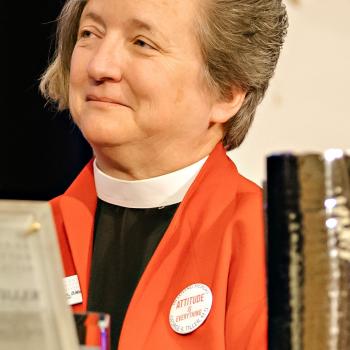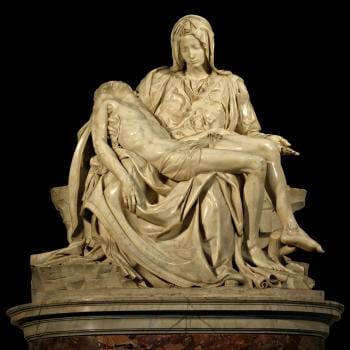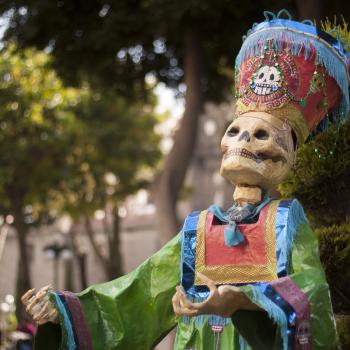Yesterday in Texas, an avowed white supremacist, John William King, was executed for his part in the gruesome killing of James Byrd Jr. in 1998.
King and his friends Shawn Berry and Lawrence Brewer beat James Byrd then chained him to the back of their pickup and dragged him for miles along a country road. Still alive during his ordeal, Byrd was finally killed when he hit a culvert and his right arm and head were torn off. If you have the stomach for it, you can read the whole sickening story here.
Berry was sentenced to life in prison. Brewer was executed in 2011 and King yesterday. Brewer and King never expressed remorse for their crimes saying they would do it again if they had the chance.
King had several racist tattoos: a black man hanging from a tree, Nazi symbols, the words “Aryan Pride”, and the patch for a gang of white supremacist inmates known as the Confederate Knights of America.[19] In a jailhouse letter to Brewer that was intercepted by jail officials, King expressed pride in the crime and said that he realized while committing the murder that he might have to die. “Regardless of the outcome of this, we have made history. Death before dishonor. Sieg Heil!” King wrote.[2] An officer investigating the case also testified that witnesses said that King had referenced The Turner Diaries after beating Byrd.
So here we have three guys who are just about as despicable and disgusting specimens of humanity that you can imagine. What is your reaction?
Should Brewer and King have been executed?
I’m a Catholic and my church teaches that the death penalty is wrong. Until recently the wording in our teaching on the matter has been that the death penalty should not be used, but it still left an opening for its use in extreme circumstances, but more recently Pope Francis has changed this article in the Catechism to read:
2267. Recourse to the death penalty on the part of legitimate authority, following a fair trial, was long considered an appropriate response to the gravity of certain crimes and an acceptable, albeit extreme, means of safeguarding the common good.
Today, however, there is an increasing awareness that the dignity of the person is not lost even after the commission of very serious crimes. In addition, a new understanding has emerged of the significance of penal sanctions imposed by the state. Lastly, more effective systems of detention have been developed, which ensure the due protection of citizens but, at the same time, do not definitively deprive the guilty of the possibility of redemption.
Consequently, the Church teaches, in the light of the Gospel, that “the death penalty is inadmissible because it is an attack on the inviolability and dignity of the person”,[1] and she works with determination for its abolition worldwide.
Was he right to do so? Some Catholics disagree. Two eminent philosophers, Edward Fesser and Joseph Bessette in their book By Man Shall His Blood Be Shed make the case the capital punishment should be retained.
They reason that capital punishment not only deters violent crime, but that it also punishes the crime justly and objectively.
The pope’s reasoning in changing the catechism is that if the criminal is not executed he will still have time to repent. Those in favor of the death penalty observe that the imminence of their execution will help them to focus on the need for that repentance. The person who knows exactly the day and hour of his death will therefore have the motivation to repent according to that deadline.
When confronted with the unmitigated evil of people like Berry, Brewer and King, it is difficult for ordinary people not to rise up in furious rage to demand justice. Those in favor of the death penalty will challenge their opposite numbers in the debate with the horrific crime, look them in the eye and say, “Do you really, honestly believe this human cockroach deserves to live on the taxpayers’ dime for the next thirty years with three square and a roof over his head?”
The film Dead Man Walking–the story of anti-death penalty campaigner Sister Helen Prejean–faces these tough questions. When working with the convicted rapist and murderer she comes to realize just how deep the darkness in him runs. At a crucial point after she has got him to read the gospel he says he identifies with Jesus and sees himself as a victim. At that point she too wonders whether he is beyond redemption.
Finally, there is the question of eternal justice. I wonder what those who believe God is too good and merciful to send anyone to hell think when confronted with John William King and Lawrence Brewer. Do they really believe such men should go to heaven for all eternity or do they think they should go to hell?
If Brewer and King did not repent during the extra twenty years of life they had here on earth would they ever repent?
Me? I doubt it.
But then, who am I to judge?












